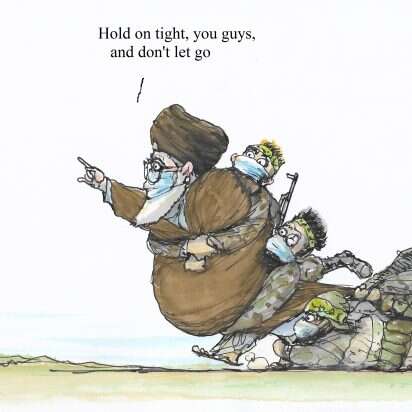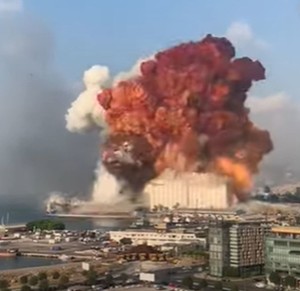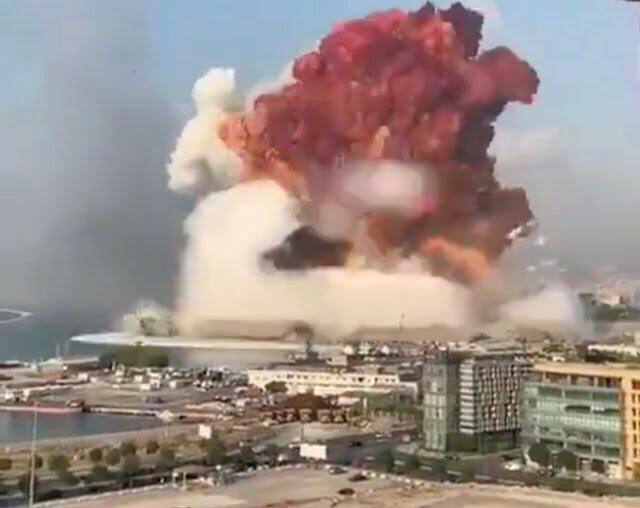Seth J. Frantzman: Help Lebanon: Remove Hezbollah’s Stranglehold — and Its Dangerous Missile Stockpiles
The results of Hezbollah’s machinations are clear: constant tensions with Israel, and the lurching of once lush and prosperous Beirut from one failure to the next, from brownouts to lack of basic services for citizens. Lebanon is in the midst of a financial crisis and requires some $93 billion for a bailout. Hezbollah has suggested Lebanon turn to China for help, as part of its goal to replace U.S. influence in Lebanon with China, Iran, and other U.S. adversaries. It may try to leverage the devastation to deepen its tentacles over the country using its network of social services and volunteers.Seth J. Frantzman: How will Hezbollah react to this week’s massive blast in Beirut?
What can be done to address Lebanon’s mounting problems, now compounded by this tragic explosion, while reducing Hezbollah’s corrosive influence? First, Hezbollah needs to be isolated from the financial system and from the flow of weapons coming from Iran. In recent years, Hezbollah sought to acquire precision-guided munitions and to establish factories for them in Lebanon. It has also threatened Israeli infrastructure. In a 2016 speech, Hezbollah leader Hassan Nasrallah even threatened to target ammonium-nitrate storage in Israel to cause the kind of explosion that just levelled Beirut. This leaves no doubt that the terrorist group knows exactly the level of devastation it wanted to cause in Israel and the threat it still poses. The Alma Research Center in Israel recently revealed that Hezbollah has 28 rocket-launch sites around Beirut. The recent explosion makes it clear that Hezbollah’s use of civilian areas for weapons storage must be stopped in Lebanon.
Yet many countries looking to provide support for Lebanon will likely do so without seeking to disentangle Hezbollah. Russia, Iran, and China may be amenable to working with Nasrallah while Turkey, Qatar, and France could turn a blind eye to the group’s role. Saudi Arabia, once a major backer of Lebanon and broker of the 1989 accords that ended the country’s civil war, opposes Hezbollah’s role. As do other Gulf states, such as the United Arab Emirates. The U.S. can help Lebanon, monitor reconstruction, and advise on implementing financial and port-inspection standards, sidelining Hezbollah in the process.
In the immediate aftermath of the disaster, aid will be concentrated on finding missing people and avoiding an economic collapse or a health crisis amid the COVID-19 pandemic. Once this period has passed, it is essential that the dust not merely settle with Hezbollah more entrenched and powerful, its system of illicit weapons and warehouses full of munitions still dotting the civilian landscape. If Hezbollah does capitalize on this disaster, it will only accelerate Lebanon’s economic collapse, and hold the country hostage in a future war with Israel.
THIS WEEK, the massive explosion represents another possibility for Hezbollah. While it may initially get some criticism and heat for the explosion, because it also maintains dangerous stockpiles of weapons all over Lebanon, it will find a way to leverage this to its benefit. Hezbollah wants China, Russia and Iran to help rebuild Lebanon. Turkey and Qatar are also rebuilding the country, but Hezbollah has amicable relations with Doha.Kohelet Forum: UNIFIL – A Last Chance to Reform Ineffective UN Missions While Protecting Israel
Now Hezbollah may have to wait some time before making its moves clear. This is because it can’t raise its head too much and appear to gloat over the destruction. It will instead try to send volunteers to help and portray itself as the responsible party. It will try to shift blame to Israel and the US. While others are distracted with solidarity for Beirut, Hezbollah will increase its stranglehold elsewhere. This has always been the Hezbollah model. It may increase trafficking in weapons from Syria and construct new bases.
Israel would be reticent to carry out any actions in Lebanon amid tensions with Hezbollah, because Israel will not want to be seen as harming Lebanon more. This means the explosion becomes a perfect smokescreen and solidarity shield for Hezbollah. For average Lebanese, it is yet another disaster in a long series of disasters.
While Hezbollah will pretend to be patriotic, it will work behind the scenes to corrupt everything that comes into Lebanon in the next year.
Overview: From the start of the Trump Administration, the U.S. has sought to reform the bloated United Nations. Peace-keeping missions were to be a central part of this reform, as they are the most expensive aspect of the UN’s operations, but commonly fail to deliver tangible results while being plagued with scandal, corruption, and criminality.
To date, the U.S. has not succeeded in reigning in any peacekeeping missions. Aug. 31st offers a final opportunity to do so, while strengthening Israel’s security at a time when it faces imminent threats on the northern border from the Iranian-backed Hezbollah.
UNIFIL, the temporary U.N. presence in Lebanon, is not fulfilling its mandate to disarm Hezbollah. Instead, it serves as Hezbollah’s de facto human shield, limiting the IDF’s freedom to maneuver in a potential conflict. The organization is expensive and bloated compared to other peacekeeping missions around the world, has had significant mission creep, and like other U.N. entities, it is biased against Israel. This month, there will be a golden opportunity to fix UNIFIL’s structural problems, from an Israeli standpoint. This special opportunity might not return for a long time.
For the sake of Israeli and American strategic interests, it would be best if the United States demanded that the Security Council let UNIFIL’s mandate expire, without a further extension, or alternatively scale it back significantly.




































